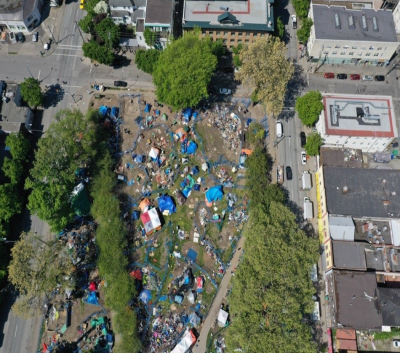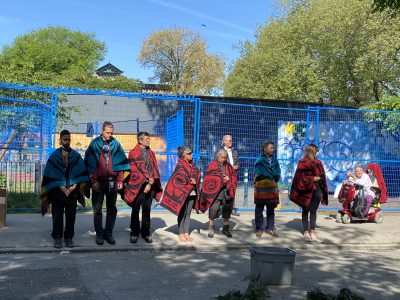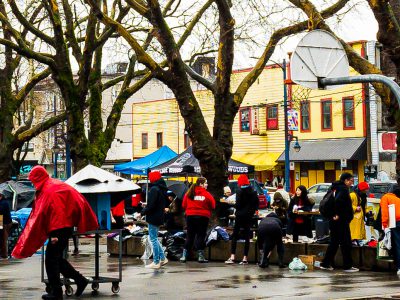The CAEH is developing a series of stories highlighting successful encampment resolutions that are people-centered and housing-focused, without using enforcement as the primary approach. Read the first blog in this series highlighting Fort McMurray, Alberta.
by Nadia Moharib
Behind the encampment tarps and tents are communities comprised mostly of people trying to survive another day. And in the midst of all the political ping-pong on how to address the shameful illustrations of a housing crisis scattered across the country, camp residents are rarely part of the conversation.
Instead, they are often brutally silenced when kicked out of encampments with or without affordable and appropriate housing lined up.
Stephanie Allen calls it “dehumanizing” and avoidable.
“I think encampments demonstrate the failures of the system. They are a symptom of a deeper problem. It’s absolutely a housing problem. We can’t take the focus off of it being a housing solution,” she says. “I’m sickened by it. I want to go to every city doing this and say you can do this better.”
Allen did just that.

A drone photo of the Oppenheimer Park encampment.
In 2019, as BC Housing’s newly minted vice-president of strategic operations, she was tasked with shuttering Vancouver’s Oppenheimer Park tent city, again.
She walked into the job in early August just after the City of Vancouver had cleared the encampment leaving outrage and anger over how it was done. There was backlash for the traumatizing, enforcement-heavy approach and lack of a bonafide connection to housing options for those ruthlessly relocated.
And it didn’t work.
Without fences, many simply moved back onto the site and others set up camp there — lured by the prospect of somewhere to stay albeit unacceptable and dangerous with the constant threat of predators who moved about in the midst of it all.
Within weeks of the city’s decampment, Allen began conversations with Oppenheimer Park residents and advocates eager to vent, a fraught yet meaningful process that would span about nine months. She learned that housed amid the tents and tired souls at the Downtown Eastside site, lived a community of people struggling with their own issues and a shared desperation.
Encampments are not a solution to homelessness but a tragic survival mechanism many resort to given a lack of affordable housing options. That said, every time one is taken down it means not only removing what some call a neighbourhood eyesore but ripping apart a community.
“I didn’t know encampments were an entire ecosystem of people surviving and taking care of each other,” Allen says.
Critics of the prior Oppenheimer decamping cited trauma and stress created by not only the enforcement-style approach but lack of engagement with those impacted.
 Allen didn’t want to repeat that mistake.
Allen didn’t want to repeat that mistake.
Instead of simply relocating people, she and her team decided that the voices of those being relocated would be part of the careful planning and execution. They would forgo the all-too-familiar heavy-handed approach, opting for a compassionate and respectful one instead. She gave those living at Oppenheimer her word that, on behalf of B.C. Housing, they would work with them every step of the way.
“And I apologized,” Allen says. “That was my starting point.”
With Park Board representatives, they held regular meetings with residents, gathering in an overdose tent and other times seeking direction from leaders like the late Chrissy Brett, an Indigenous advocate for human rights for unhoused people. They offered coffee, breakfast, and an invitation to talk.
And they listened.
“That was a completely new thing, to have executives and senior management people sitting down in an encampment to listen to the needs of people on the ground,” Allen says. “We wanted to take a harm-reduction approach to moving people indoors.”
Outreach workers and peer supporters, including some who were once homeless and many from Indigenous groups, were recruited as part of a compassionate but urgent decampment strategy.
Their task was to build relationships to help people move up into stable housing when they moved out of the park. Housing meant something different for each individual and it was key to know what that was. It was also crucial to ensure people were not just relocated but connected to affordable, appropriate housing rather than hustled into shelters.
A pet-friendly place for a man toughing it out in a tent with his dog while he underwent cancer treatment. Something decent for the guy with bed bug bites along his neck after living in a single-room occupancy and a little understanding for someone refusing housing because they feared having a real address would mean credit card companies would track them down to recoup debts.

Courtesy of Patrick Pouponneau.
Patrick Pouponneau, a B.C.-based outreach worker and operational lead, made a detailed map of where people’s tents were located and a list of needs so they could be matched with suitable housing. Ensuring everyone was “appropriately housed” was the right thing to do and would also lessen the chances they would be forced back to a camp to flee sketchy lodgings with predatory neighbours.
Pouponneau says it was all a dignified departure from decampments which often are done with no communication, little warning, aggression from authorities, and not much in the way of new beginnings.
“Imagine someone just kicks in your door and pulls you out of your house and maybe, if you’re lucky, gives you a piece of paper with a phone number for resources that don’t exist,” he says. “Folks have no say. We are essentially warehousing human beings.”
Allen says the commonly-repeated “decampments to nowhere” means people don’t get connected with housing, which is a fundamental right. People need a plan not punishment and success hinges on offering affordable housing, says Allen who is now a housing and community development consultant.
“We housed a guy from Oppenheimer who had been living in a shelter for five years,” she says. “The only mental health issue he had was depression and anxiety from being homeless. He was simply poor, alone, and homeless. It was life-changing. He made friends again, got a job and it stabilized his life.”
Pouponneau says many opt for an encampment as a last resort rather than a choice.
“Listen, I’ve worked in encampments in Victoria, Nanaimo, and multiple in Vancouver,” he says. “Nobody. Nobody. Nobody chooses to be in an encampment. That is for them the safest most appropriate ‘option.’”
Appropriate housing, not a campsite, offers the best starting point for those rebuilding their lives.
“If I’m, say, an urban Indigenous person and I am going into treatment to unearth this incredible trauma, am I supposed to go to a bunk bed infested with bugs and work through that?” he asks. “If I’m a schizophrenic trying to rework my mind, am I supposed to do that in a tent?”
By April 2020, a provincial order as part of the province’s response to the COVID-19 crisis, mandated the clearing of encampments. A May 9th deadline added urgency to the process.
About 300 people were relocated from Oppenheimer to supportive housing over a nine-day period. Six months later, upwards of 80 per cent were still there.
Unlike many decampments across the country, it was cooperative and mostly protest-free — cognizant of how traumatizing the process can be when it isn’t approached with compassion, not only for residents but those tasked with removing often distraught fellow human beings from the only home they have.
“We are dehumanizing people who are homeless to such a degree that anger and violence is now justified to be used against people who are poor,” Allen says. “It’s a very difficult thing to witness that level of human suffering and it doesn’t have to happen.”
“Everyone involved becomes traumatized. All of us, the people who have to walk by people in sleeping bags to get coffee, people in decision-making positions, elected officials, workers doing front-line services…it is systemic dehumanization,” she adds. “We are kind of thrust into it because we are letting the system off the hook for providing safe, affordable, accessible housing.”
Pouponneau says the Oppenheimer experience was difficult but worked for many reasons, key being collaboration between residents and those tasked with decamping.
Together they shared a vision for something better, something which can be nearly impossible to do when you live in a tent fixated on day-to-day survival and the threat of losing what little you have to authorities who show up unannounced.
“Survival is very myopic,” he says.
He says the mere visibility of encampments, seen by many as nothing but ugly and unwelcome, offers an important and necessary commentary.
“They shouldn’t exist but they serve a purpose. If you have an encampment in your community, you’re gonna notice,” he says. “There is a way out of this. That’s when we all get together and really act like housing is a human right. It’s not just a homeless problem, it’s a Canadian problem and it all comes down to housing.”
If you’d like to share a story of a positive encampment resolution that got people into housing, please email info@caeh.ca and share your story.
